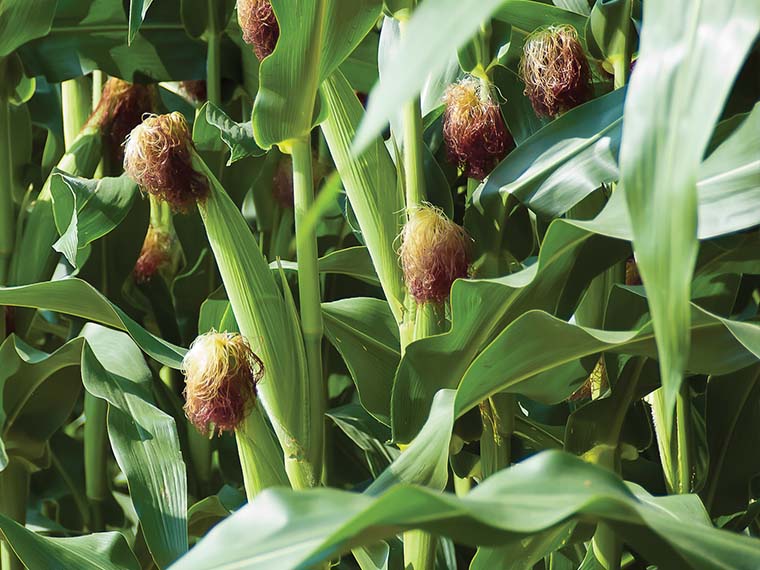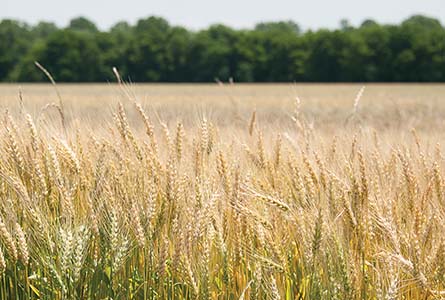The information presented on this page may be dated. It may refer to situations which have changed or people who are no longer affiliated with the university. It is archived as part of Mississippi State University's history.
Variety selection is one of the most important decisions made annually by Mississippi row crop and forage producers.
"Timely, objective, scientifically-based, and regionally relevant information on expected yield performance is crucial for making planting decisions," said Reuben Moore, associate director of the Mississippi Agricultural and Forestry Experiment Station. "The Experiment Station's independent assessment of varietal performance is extremely important and beneficial to Mississippi producers."
The Mississippi Agricultural and Forestry Experiment Station has conducted Variety Trials since the early 1900s. MAFES Official Variety Trials are unique because they provide an annual, open, unbiased, scientifically-based evaluation of genetic performance of an enormous number of seed entries. MAFES Official Variety Trials provide the information producers need to make the best seed selections for their planting decisions.
MAFES Official Variety Trials, which are conducted on MAFES Experiment Stations as well as farmer/producer fields, follow standard farming practices.
MAFES Official Variety Trials require seed treatment on corn and encourage all companies to use their best commercially-available seed treatments. If seeds are not treated, a standard, labeled rate of a fungicide/insecticide will be applied to those varieties. Fertilizer is applied to all plots based on analysis from soil tests. Plots are monitored weekly to address weed, insect, and disease control along with irrigation scheduling. MAFES Official Variety Trials on private farmland are irrigated at the producers' discretion and are irrigated as needed on Experiment Station lands.
Plot sizes are designed to provide a statistically-valid, scientific approach to small plot replicated research. Small plots allow scientists to test a large number of replicated varieties and hybrids. All crops are planted within the optimal planting window. With multiple locations, all crops are not planted on the same exact date; however, each singular location is completely planted in one day. Since each location is a separate experiment and is not compared statistically to other locations, it is not critical that all varieties are planted the same day.
Weight and moisture are captured at the time the plots are harvested. Reported yield is adjusted for moisture.
MAFES Official Variety Trials differ from on-farm strip trials conducted by Extension and individual producers. MAFES Official Variety Trials are replicated small plot studies in which varieties are randomly assigned to uniform plots in a designed experiment. On-farm strip trials are typically non-replicated side-by-side comparisons of a single planter pass of different varieties. Strip trials are used for demonstration purposes and as another tool for evaluating varieties.
The MAFES Official Variety Trials follow similar protocols as trials in other states. A similar number of varieties are screened and yields produced are equal and, most often, exceed those of surrounding states.
With increased new varieties exhibiting enhanced disease and insect resistance, the MAFES Official Variety Trials undergo continuous improvement each year.
Continuous Improvement
Continuous improvement is a term adopted from manufacturing. It is an ongoing effort to improve products, services, or processes. MAFES Official Variety Trials utilize the continuous improvement philosophy. Specifically, the Experiment Station seeks to evaluate and effectively implement methods to enhance protocols and varieties to meet the needs of producers and improve communication on test results, while maintaining scientific and objective analysis.
The Experiment Station's continuous improvement includes the following steps to enhance the MAFES Official Variety Trials.
Protocols
To enhance protocols and varieties to meet the needs of producers, while maintaining the scientific and objective analysis, the following have been implemented in 2014.
- An agronomic faculty member has been hired to conduct a self-study of variety/hybrid trials in soybeans and corn.
- All plots are monitored weekly for implementation of cultural practices such as weed, insect, and disease control, along with irrigation scheduling.
- Advisory committees have been expanded to include more capacity and ensure that each crop has an active advisory committee.
- A few standard, commercially-available benchmark varieties have been included in the MAFES Official Variety Trials.
Communication
A MAFES Official Variety Trials website has been developed. Yield results are posted within 2-3 weeks after harvest. All other sites have been redirected to mafes.msstate.edu/variety-trials.
MAFES Official Variety Trials yield data are posted on Facebook, Twitter and mississippi-crops.com blog. A news release is also sent out with yield results.
Email list for each commodity are being developed to communicate commodity-specific data when the yield data is posted on the MAFES Official Variety Trials website.
Redesign of the Official Variety Trials publication is in progress with the goal of clearly identifying experimental varieties.
Timely, objective, scientifically-based, and regionally relevant information on expected yield performance is crucial for making planting decisions.
Reuben Moore


